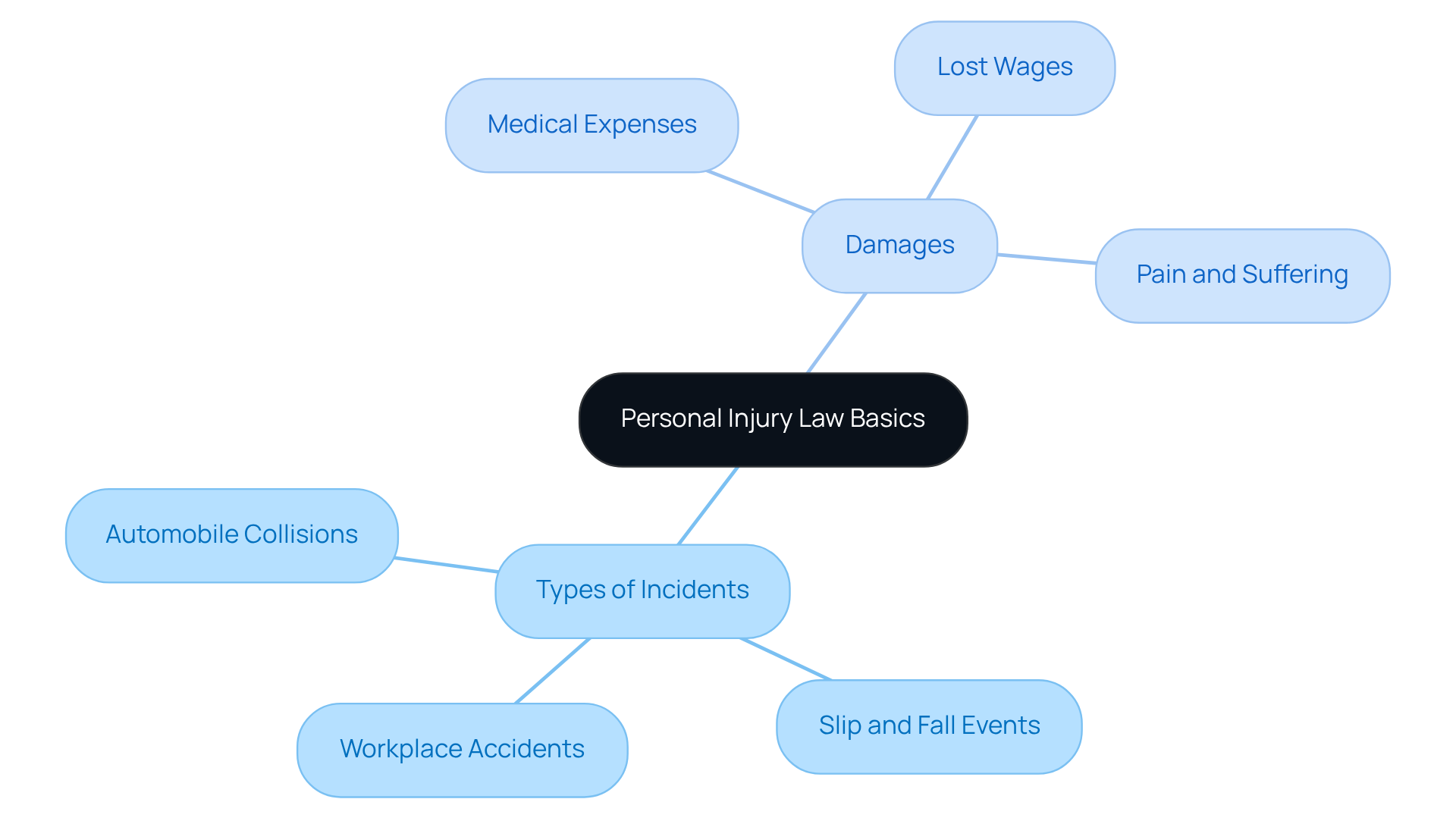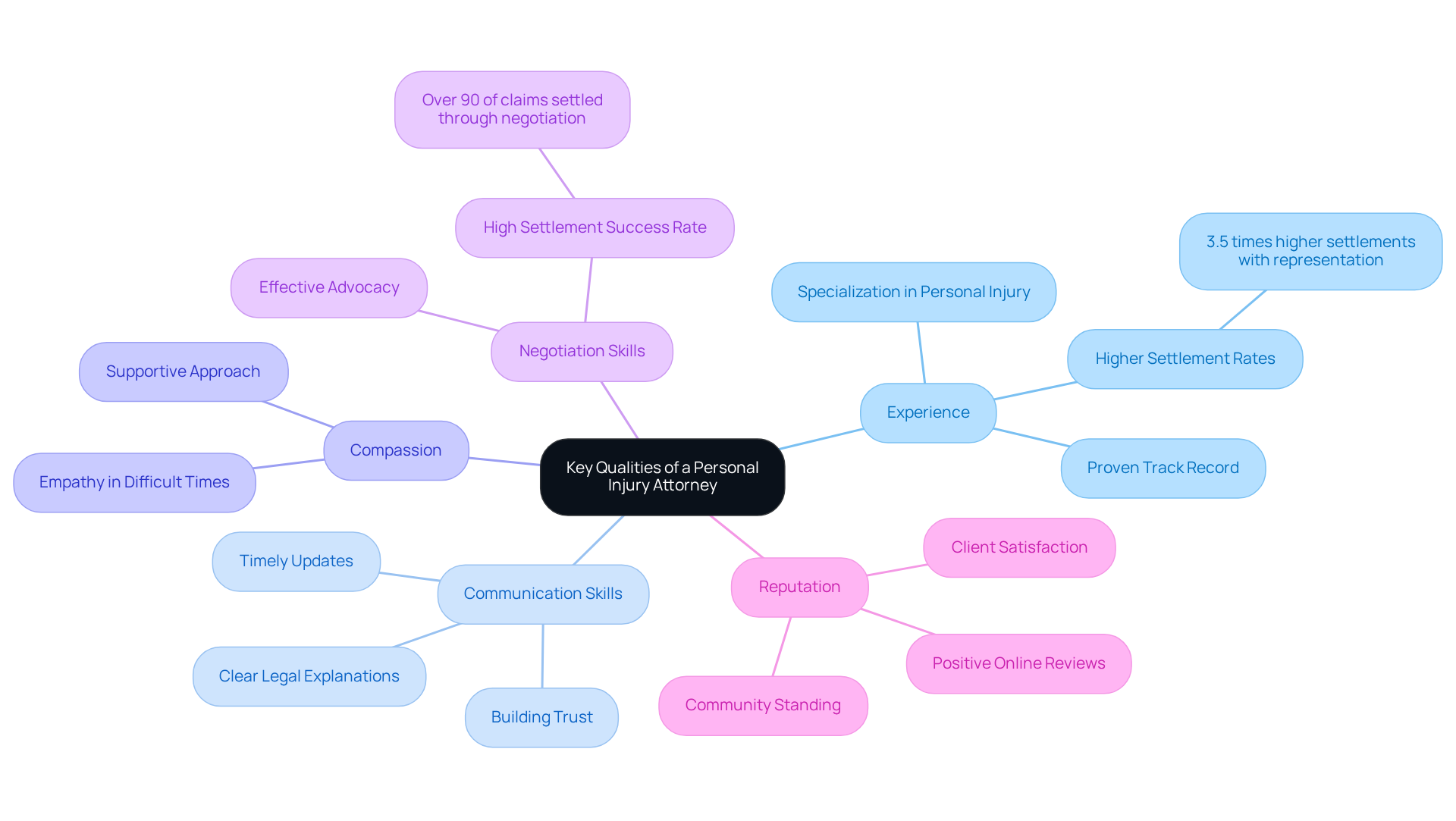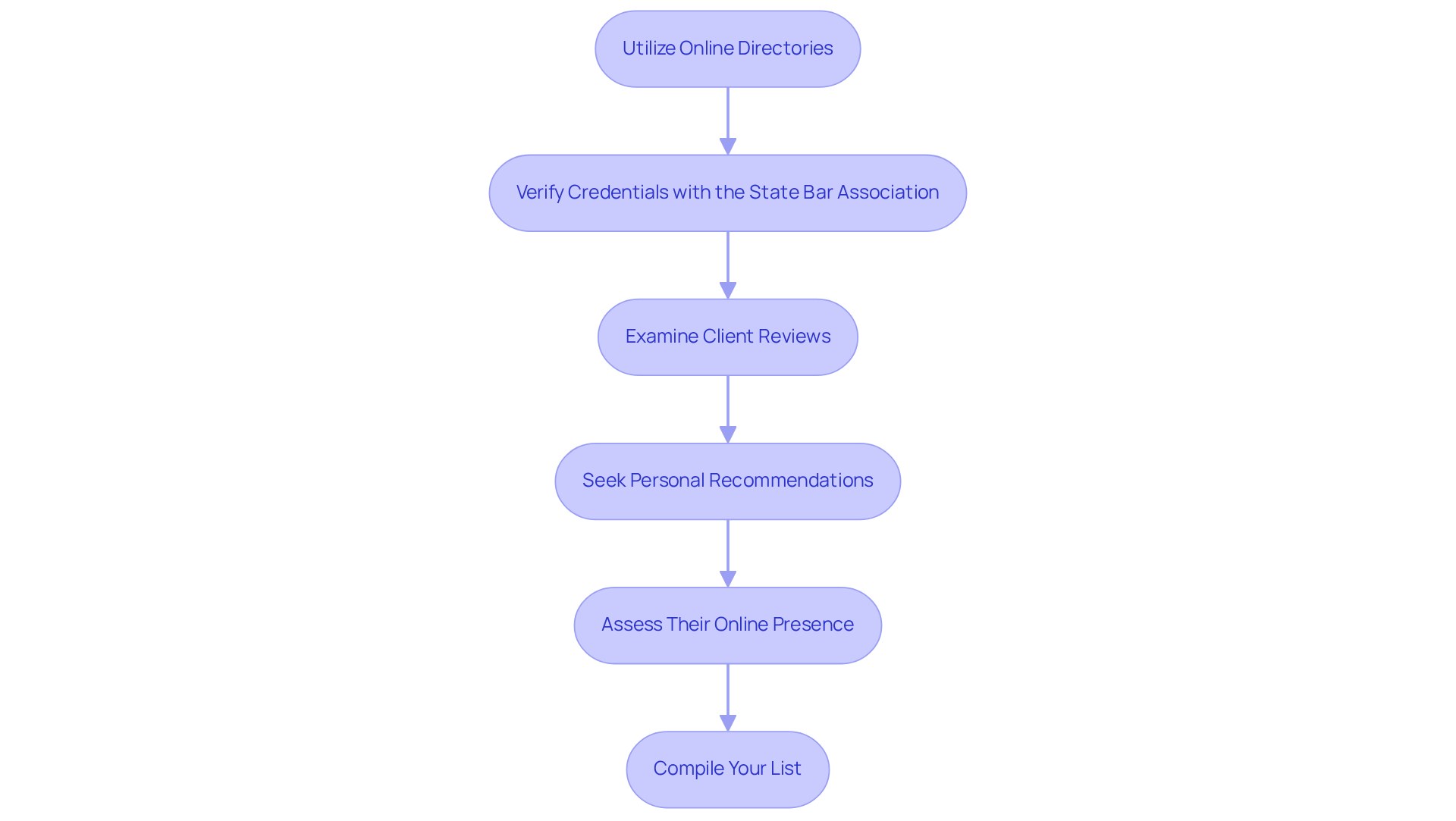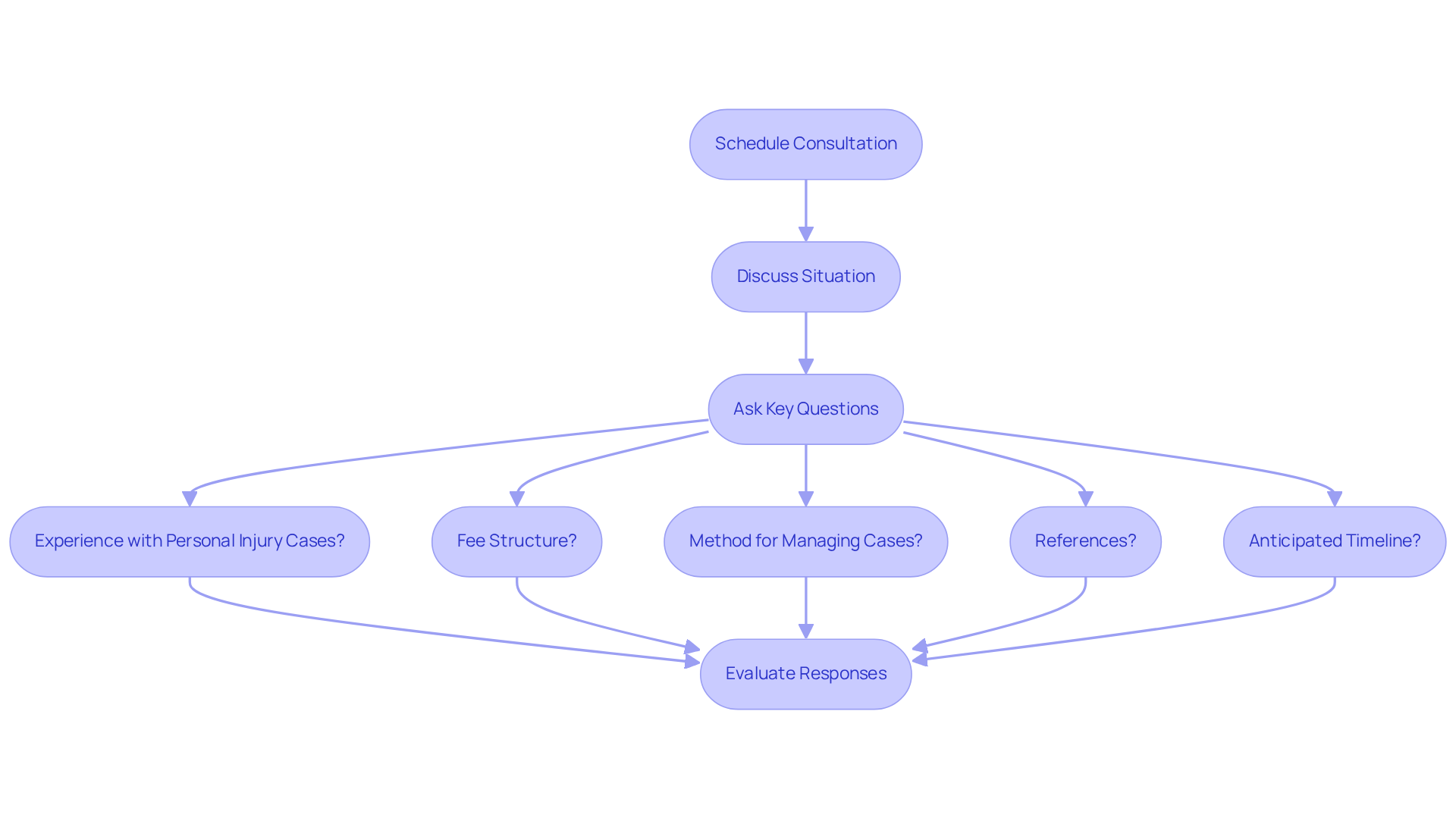Overview
Finding a personal injury attorney in your area can feel overwhelming. You may be grappling with confusion about personal injury law, unsure of what qualities to look for in an attorney, or where to begin your search. This article highlights essential factors such as:
- Experience
- Communication
- Negotiation skills
These qualities make for a strong attorney. We provide a step-by-step approach to help you evaluate potential candidates, ensuring you feel empowered to make informed choices as you navigate your personal injury case. Remember, you’re not alone in this fight—we’re here to support you every step of the way.
Introduction
Navigating the aftermath of an accident can feel overwhelming. The complexities of personal injury law, including negligence, liability, and potential damages, often add to the confusion. Understanding these nuances is crucial for anyone seeking justice and compensation. This guide serves as a comprehensive roadmap for finding a personal injury attorney in your area. It highlights essential qualities to look for and offers practical steps to help you make an informed choice. With so many options available, how can you determine which attorney truly has your best interests at heart? Remember, you’re not alone in this fight.
Understand Personal Injury Law Basics
Personal harm law addresses the real conflicts that arise when someone suffers due to another's negligence or intentional actions. Common incidents include:
- Automobile collisions
- Slip and fall events
- Workplace accidents
It's crucial to understand what damages you can claim, typically covering:
- Medical expenses
- Lost wages
- Pain and suffering
With the help of a personal injury attorney in my area, familiarizing yourself with terms like 'negligence,' 'liability,' and 'damages' is essential for effectively communicating your situation to potential attorneys. Notably, around 95% of personal harm cases result in compensation, which underscores the importance of having a personal injury attorney in my area for legal assistance. Real-world scenarios, such as disputes over responsibility in rideshare accidents or the complexities of self-driving car incidents, highlight the nuances of harm-related claims. This foundational knowledge empowers you to navigate the legal process with confidence and clarity.

Identify Key Qualities of a Personal Injury Attorney
When searching for a personal injury attorney, consider these essential qualities that can make a difference in your journey:
- Experience: Seek out an attorney with a proven track record in handling personal injury cases similar to yours. Remember, individuals with legal representation often secure settlements that are, on average, 3.5 times greater than those without support. You deserve someone who knows the ropes.
- Communication Skills: An effective attorney should clearly explain legal concepts and keep you informed throughout the process. Prompt communication cultivates trust, ensuring you feel supported every step of the way.
- Compassion: Personal injury matters can be emotionally taxing. A lawyer who demonstrates empathy can significantly lighten the burden during difficult times, making the legal process more manageable for you.
- Negotiation Skills: Many personal injury cases resolve outside of court, making strong negotiation abilities essential. A lawyer's capacity to advocate effectively can lead to better settlement outcomes, as over 90 percent of injury claims are settled through negotiation or mediation.
- Reputation: Investigate online reviews and testimonials to gauge the lawyer's standing in the community. A solid reputation often reflects a legal professional's commitment to client satisfaction and successful results.
By prioritizing these qualities, you can narrow down your options and find a personal injury attorney in my area who is prepared to fight for your rights and navigate the complexities of your case. Remember, you’re not alone in this fight; we stand with you.

Research Local Personal Injury Attorneys
To effectively research local personal injury attorneys, follow these essential steps:
-
Utilize Online Directories: Leverage platforms like Avvo, FindLaw, and the American Bar Association to locate qualified legal professionals in your area. These directories often feature peer ratings and client reviews, giving you a well-rounded view of potential candidates.
-
Verify Credentials with the State Bar Association: Confirm the legal representative's credentials and ensure they are in good standing with the state bar. This step is crucial for establishing their legitimacy and expertise in personal injury law.
-
Examine Client Reviews: Investigate client feedback on platforms like Google, Yelp, and social media. Many clients review feedback before hiring a lawyer, making this a vital part of your assessment process.
-
Seek Personal Recommendations: Reach out to friends, family, or colleagues who have faced similar legal challenges. Personal recommendations can guide you to reliable lawyers who have demonstrated success in their work.
-
Assess Their Online Presence: A professional website can provide valuable insights into an attorney's experience, areas of specialization, and client testimonials. Look for transparent communication and evidence of effective attorney-client relationships, as these elements often correlate with favorable outcomes in personal injury cases. Additionally, inquire about their pricing model; many respected firms, such as Vasquez Law Firm, operate on a contingency fee basis, meaning you owe nothing unless they succeed in your case. This approach ensures that financial constraints do not hinder your pursuit of justice.
By following these steps, you can compile a comprehensive list of potential lawyers, including a personal injury attorney in my area, to evaluate for your situation, ensuring you make a well-informed choice in your quest for legal counsel.

Schedule Consultations and Ask the Right Questions
After creating a shortlist of potential attorneys, including a personal injury attorney in my area for bodily harm, it's crucial to arrange meetings to discuss your situation in detail. During these meetings, consider asking the following key questions:
- What is your experience with personal injury cases? Inquire about their background and success rate in handling situations similar to yours. Experience can significantly influence the outcome of your case.
- How do you charge for your services? Clarify their fee structure, including any contingency fees, to fully understand your financial obligations. Most personal injury lawyers work on a contingency basis, meaning they only receive payment if you succeed in your claim.
- What is your method for managing situations? Assess their strategy and how they plan to advocate for you. Will they prioritize settlements, or are they prepared to go to trial if necessary?
- Can you provide references? Request contact details for previous clients to gain insights into their experiences and satisfaction with the lawyer's services.
- What is the anticipated timeline for my situation? Understanding the expected duration of the legal process can help you manage your expectations and plan accordingly.
These questions are essential for evaluating whether a personal injury attorney in my area has the qualifications that align with your needs for your personal injury case. Statistics show that clients who engage in thorough consultations often report higher satisfaction levels, feeling more informed and confident in their legal representation.

Conclusion
Finding the right personal injury attorney can significantly impact the outcome of your case. This guide highlights the importance of understanding personal injury law and the qualities that make an attorney effective in navigating these complexities. By equipping yourself with knowledge about negligence, damages, and the legal process, you can confidently seek the legal representation you deserve.
Key insights include essential qualities to look for in a personal injury attorney:
- Experience
- Communication skills
- Compassion
- Negotiation abilities
- Reputation
Additionally, we outline practical steps for researching local attorneys, from utilizing online directories to seeking personal recommendations. Scheduling consultations and asking the right questions ensures you can evaluate potential attorneys effectively and find the best fit for your unique circumstances.
Engaging a qualified personal injury attorney is not just about legal representation; it's about having a partner who will advocate for your rights and help secure the compensation you deserve. As you embark on this journey, remember that thorough research and thoughtful consideration are crucial. Take the time to find an attorney who aligns with your needs, and empower yourself to pursue justice with confidence. We’re here to fight for your family—your future matters to us. Yo Peleo — We Fight.
Frequently Asked Questions
What is personal injury law?
Personal injury law addresses conflicts that arise when someone suffers harm due to another person's negligence or intentional actions.
What are common incidents that fall under personal injury law?
Common incidents include automobile collisions, slip and fall events, and workplace accidents.
What types of damages can be claimed in a personal injury case?
Typical damages that can be claimed include medical expenses, lost wages, and pain and suffering.
Why is it important to understand terms like 'negligence,' 'liability,' and 'damages'?
Understanding these terms is essential for effectively communicating your situation to potential attorneys and navigating the legal process.
What percentage of personal injury cases result in compensation?
Approximately 95% of personal injury cases result in compensation.
How can a personal injury attorney assist in a case?
A personal injury attorney can provide legal assistance and guidance throughout the process, helping to ensure that you understand your rights and options.
What are some complex scenarios in personal injury cases?
Complex scenarios include disputes over responsibility in rideshare accidents and the intricacies of self-driving car incidents.




